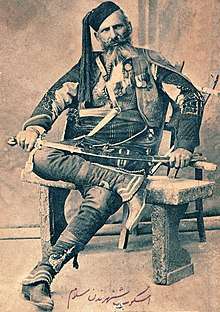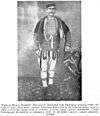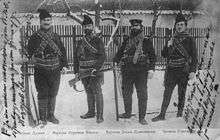Micko Krstić
Micko Krstić-Porečki (Serbian Cyrillic: Мицко Крстић, c. 1855 – October 29, 1909), known as Vojvoda Micko, was a Serbian rebel and military leader active in the Poreče region.
Micko Krstić | |
|---|---|
 Vojvoda Micko | |
| Nickname(s) | Porečki |
| Born | c. 1855 Latovo, Sanjak of Monastir, Ottoman Empire (present-day Makedonski Brod, North Macedonia) |
| Died | October 29, 1909 Ižište, Monastir, Ottoman Empire |
| Allegiance |
|
| Years of service | 1876–81, 1904–09 |
| Rank | vojvoda, harambaša |
| Unit |
|
Origin and early life
Krstić was born in Latovo, near Makedonski Brod in the Poreče region, at the time part of the Sanjak of Monastir, Ottoman Empire (present-day North Macedonia). His family hailed from nearby Trebino. His birth year is mostly given as c. 1855, and scarcely as c. 1840.[1] He espoused a Serb identity. His teacher in Latovo was Obradović.[2]
Serbian–Ottoman War (1876–78) and aftermath
He volunteered in the Serbian–Ottoman War (1876–78).[3] He then participated in the Kumanovo Uprising (January 20 — May 20, 1878).
After the war, the Serbian military government sent armament and aid to rebels in Kosovo and Macedonia.[4] Christian rebel bands were formed all over the region.[4] Many of those bands, privately funded and aided by the government, were established in Serbia and crossed into Ottoman territory.[4] In that way, Micko Krstić formed a rebel band in 1879 in Niš, with the help of Nikola Rašić and the military government in Vranje.[4]
Micko's bands received weapons and ammunition in Vranje.[5] It crossed the border and came into conflict with Ottomans in around Kriva Palanka, where many of his fighters were killed.[5] With only one comrade, Micko went to Poreče and joined the band of Stevan Petrović–Porečanin, established in the same year.[5]
Brsjak Revolt
On 14 October 1880, an uprising broke out in Poreče, known as the Brsjak Revolt.[6] Micko was one of the leaders, along with Ilija Delija, Rista Kostadinović, and Anđelko Tanasević.[7] This uprising would span little more than a year.[6]
In springtime 1881, in the Devet Jugovića-inn in Vranje, Micko Krstić assembled a band of 13 fighters, friends, blood-brothers and followers, left Serbia in springtime 1881.[8] One of the members were Čakr-paša.[9] Their first teacher and leader was Čerkez Ilija.[8] In April 1881, the bands of Čerkez Ilija and Micko were surrounded near Kriva Palanka.[9] The bands were devastated by a force of Ottoman soldiers and Albanians, with Čerkez Ilija and his band all dead, Micko and the survivors fled for safety.[9] In the fight, half of Micko's band fell.[8] Micko and the survivors crossed the mountains heading to Poreče,[8] while Čakr-paša stayed on the Kozjak.[9]
He had succeeded in leading the četa (rebel band) of Rista Kostadinović when Rista had died in battle.[8] He was given Rista's gun which was ornamented with silver and nacre.[8] He was suited with the red vojvoda mintan (under jacket) by tailors in Kičevo in secrecy during the night.[8] Serbia secretly and carefully aided the Christians in the Ottoman areas; in the Brsjak revolt, however, by the end of 1881, the aid was stopped by the intervention of the Ottoman government.[10] The Ottoman army succeeded in suppressing the rebellion in the winter of 1880/1881, and many of the leaders were exiled.[11] When the revolt had been suppressed in Demir-Hisar, Micko refused to give himself up.[8] The Brsjak Revolt, and the preceding ones in Kumanovo, Kriva Palanka and Kratovo, had all a Serbian character, planned in the Serbian cause, thus, the unsuccessful outcome resulted in persecution of Serbs in the Macedonia region, with an increased Bulgarization of the region's Christian Slavic populace.[12]
Imprisonment

Krstić was imprisoned in 1882 by the Ottomans, and held in the Bitola prison. He was sentenced to 20 years imprisonment.[13] He wrote nine letters to the Serbian consulate in Bitola, Milojko Veselinović.[14] During the Greco-Turkish War (1897), the Bulgarians granted amnesty to Bulgarians held in Ottoman prisons; Micko refused to identify as Bulgarian and stayed in jail.[13] Finally, in 1901, the Serbian consulate managed to have him released, though he was under house arrest in Bitola, and was obliged to contact the town government every day.[15]
Meanwhile, the first Serbian guerilla bands were formed through self-organizing of Serb villages in Poreče, Kumanovo and Kratovo provinces, which, along Veles, were exposed the most to Bulgarian violence.[15] Krstić's escape, on April 4, 1904, was organized by Savatije Milošević, of the Bitola Consulate, Jovan Ćirković-Ćifa, a secretary of Metropolitan Polikarp, Lazar Kujundžić, manager of schools in Kičevo, and Marko Cerić.[15] The presence of the Serbian bands were soon felt in the regions.[15] Of the 40 villages in Poreče, only one village, Lokvica, adhered to the Bulgarian Exarchate.[15]
Serbian Chetnik Organization

Micko Krstić was selected as the supreme vojvoda (commander) for Poreče.[15] The first success of the četa (band) of Vojvoda Micko came with the conflict against 8 combined Bulgarian bands led by Dame Gruev, who sought to violently return the Poreče villages to the Bulgarian Exarchate and thereby strengthen the Bulgarian influence in those villages.[15] The conflict took place near Slatine in Poreče on October 5, 1904.[15] The Bulgarian bands were resting in a ravine following clashes with the Ottoman army at Movnatac, located at the entrance of Poreče.[15] The Serbian Chetniks, numbering c. 40 fighters, silently surrounded them, and with a sudden raid, destroyed the five-times greater enemy.[15] On that occasion, Bulgarian commander Đurčin and four Bulgarian fighters were killed, a large number were wounded, and the rest fled and scattered.[15] Among the wounded were Gruev, who Micko captured.[15] On the orders of Interior Minister Nikola Pašić, Gruev was freed.[15] He was escorted to the village of Solnje near Skopje, from where he travelled to Sofia.[15]
At the end of 1904, the old and exhausted Micko moved to Kragujevac, where he lived on the expenses of the Serbian Committee.[15] Zafir Premčević was his assistant.
In September 1909 the Turkish government issued a law on the suppression of rebels in Rumelia.
Death
He was assassinated in Ižište, on the Brod–Kičevo road on October 29, 1909. Rebel activity was re-activated.
Legacy
Painter Nadežda Petrović (1873–1915) wrote a drama on his life.[16]
Annotations
- His name is Micko Krstić (Serbian Cyrillic: Мицко Крстић, Macedonian: Мицко Крстиќ). His surname is sometimes spelled Krstević (Крстевић), and his full name sometimes include the byname of Pavlovski (sr. Павловски, mk. Павлевски).
References
- Marinko Paunović (1998). Srbi: biografije znamenitih : A-Š. Emka.
- Jovan Hadži-Vasiljević (1928). Prosvetne i političke prilike u južnim srpskim oblastima u XIX v: (do srpsko turskih ratova 1876-78). Društvo Sv. Save. p. 422.
... и тамо се настанио. Обрадовић је био свршио четири разреда гимназије у Београду и Богословију. Између осталога. учитељевао је и у селу Латову у Поречу. У њега је учио Мицко Крстић, познати наш усташ и четнички војвода ...
- Aleksa Jovanović Kodža (1930). Четнички споменик, Војвода Мицко, живот и рад. Skoplje.
- Hadži-Vasiljević 1928, p. 8.
- Hadži-Vasiljević 1928, p. 9.
- Hadži-Vasiljević 1928, p. 10.
- Hadži-Vasiljević 1928, p. 10, Jovanović 1937, p. 237
- Đurić & Mijović 1993, p. 61.
- Krakov 1990, p. 28.
- Matica srpska (1992). Zbornik Matice srpske za istoriju 45–48 (in Serbian). Novi Sad: Matica srpska. p. 55.
- Koliševski, Lazar (1962). Aspekti na makedonskoto prašanje (in Macedonian). Kultura. p. 499.
- Georgevitch, T. R. (1918). Macedonia. Forgotten Books. p. 183. ISBN 9781440065194.
- Đorđe N. Lopičić (2007). Konzularni odnosi Srbije: (1804-1918). Zavod za udžbenike. p. 207. ISBN 978-86-17-34399-4.
Најбо- љи пример је војвода Мицко Крстић из Пореча, који је био осуђен на 20 година затвора, али није хтео да се изјасни као Бугарин да би био обухваћен амнестојом и ослобоћен даљег издржавања казне.
- "Мицко Крстевић: писма из битољског затвора (1897-1899)". Мешовита грађа.
- Ilić, Vladimir (March 4, 2003). "Srpski četnici na početku dvadesetog veka (6): Pogibija na šupljem kamenu". Glas Javnosti.
- "Прво јавно читање драме Надежде Петровић "Војвода Мицко Поречанин"". Влада Републике Србије.; Надежда Петровић (2005). Војвода Мицко Поречанин. Библиотека града Београда. ISBN 978-86-7191-071-2.
Sources
- Milojko V. Veselinović (1905). Brsjačka buna godine 1880 u bitoljskom vilajetu i vojvoda Micko. Narodna Štamp. Obilićev.
- Krakov, Stanislav (1990) [1930]. Plamen četništva. Belgrade: Hipnos.
- Hadži-Vasiljević, Jovan (1928). Četnička akcija u Staroj Srbiji i Maćedoniji. Belgrade: Sv. Sava.CS1 maint: ref=harv (link)
- Đurić, Veljko Đ.; Mijović, Miličko (1993). Ilustrovana istorija četničkog pokreta. Narodna knj.CS1 maint: ref=harv (link)
- Надежда Петровић (2005). Војвода Мицко Поречанин. Библиотека града Београда. ISBN 978-86-7191-071-2.
- Miloš Jagodić. "МИЦКО КРСТЕВИЋ: ПИСМА ИЗ БИТОЉСКОГ ЗАТВОРА (1897-1899)" (PDF). MISCELLANEA, vol. XXXIII pp. 349-363. Archived from the original (PDF) on 2017-05-10. Retrieved 2016-01-12.